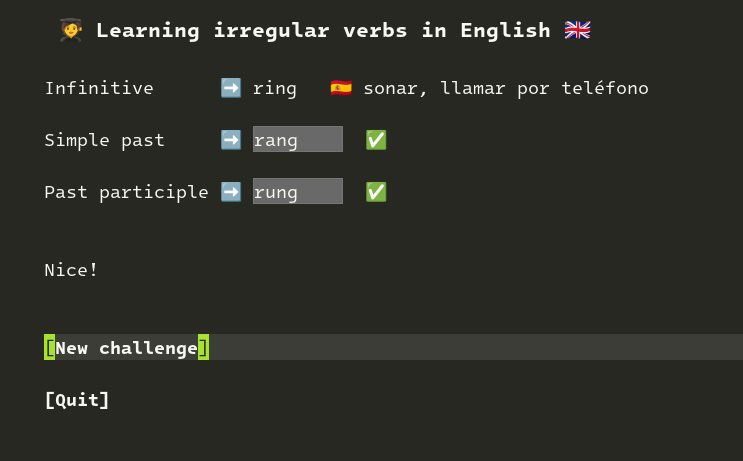mirror of
https://github.com/tanrax/lirve.el.git
synced 2025-12-13 22:54:38 +01:00
3591b590fc362a2e522a8f2068748a011df0bda4
Lirve: Learn irregular English verbs in Emacs
Lirve helps you learn irregular verbs using the spaced repetition technique. In other words: Lirve remember your mistakes and repeat the challenge in the future.
Install
You need to have straight installed.
Then, add it to your init.el.
(use-package learning-irregular-verbs-in-english
:straight (:host github :repo "tanrax/learning-irregular-verbs-in-english.el" :files ("lirve-verbs.el" "lirve.el"))
:ensure t)
And add the following to your init.el:
(require 'lirve)
Configure (Optional)
Shows the translation of the verb when resolving or failing.
Only available in Spanish (at the moment).
(setq lirve--show-translation 'es)
I also recommend creating a function to make it easier to remember the command.
(defun learning-irregular-verbs-in-english ()
"Start Lirve."
(interactive)
(lirve))
Usage
M-x lirve
Controls
| Key | Description |
|---|---|
TAB |
Move to the next field |
S-TAB |
Move to the previous field |
RET |
Click on the button |
Collaborate
If you want to add more languages, make a PR with the translations in lirve-verbs.el.
For example, the verb beat in Italian and Spanish:
(
(infinitive . "beat")
(simple-past . "beat")
(past-participle . "beaten")
(translations
(es . "golpear")
(it . "colpo")))
Languages
Emacs Lisp
100%

